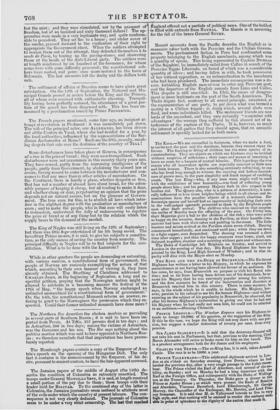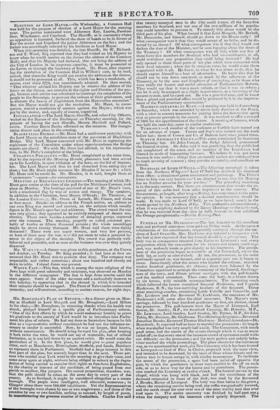The Kum—We are counselled in Scripture, when we make a
feast, to invite to it the poor and the destitute, because they cannot repay the favour. The feasting or feting of children has the same species of re- commendation. They are objects on which our kindness may be lavished without suspicion of selfishness ; their years and means of returning it leave no room for a bargain of mutual benefits. This is perhaps the true reason why all benevolent spirits are especially attached to little men and little women. There is also something extremely refreshing, to one who has lived long enough to witness the cunning and hollow-hearted. ness of grown men, in the pure simplicity arid frank temper of confiding youth. The late King—who, if any man were, might well be sated with the exhibitions of base humanity—was fond of collecting young people about him ; and his present Majesty feels in this respect as his brother, did. The Queen also, who is a pattern of domesticity, is natu- rally influenced to love those helpless beings which in all classes and de- nominations form the peculiar objects of a woman's charities. Her Sovereign spouse and herself had an opportunity of indulging their taste in the well-judged spectacle presented to them by the Brighton people soon after their arrival. The children who received on that occasion the smiles of Royalty were the offspring of the poor. On Friday last, their Majesties gave a ball to the children of the rich ; who were quite as happy on the occasion, dancing in the Pavilion, as their humble com- panions had been with their cakes and pudding in the street. The little masters and misses arrived at the Pavilion about seven o'clock. Dancing commenced immediately, and continued until ten; when they sat down to a light supper, soon despatched. The dancing was resumed a short time after supper ; and then the happy creatures went home, tired, not fatigued, to golden slumber and a morning without pain and without care. The Duke of Cambridge left Brighton on Sunday, and arrived in London in the evening of that day. His Royal Highness has been ap- pointed by the King, Lord High Steward of Windsor; and in that ca- pacity will dine with the Mayor elect on Monday.
THE KING AND THE Ex-DURE OF BRUNSWICS.—HiS Ex-Serene Highness has written a letter to his Majesty, in which he expresses his astonishment at not having been allowed the favour of an audience. He has come, he says' from Brunswick on purpose to visit his Royal rela- tion; and so far from having been driven out of his dominions, lie as- sures his Majesty that he was extremely popular among his subjects, and the first accounts he heard of the insurrection and disorders at Brunswick reached him in this country. There is some mystery, he says, in the whole which he is unable to fathom. His Majesty, how- ever, persists in his refusal to see his Ex-Serene Highness—and without entering on the subject of his popularity in Brunswick, he observed, that after his Serene Highness's indiscretion in giving out that he had seen his Majesty when he had really not seen him, he could not be admitted to an audience.—Morning Chronicle.
PRINCE LEopoi.D.—The Windsor Express says his Highness in- tends to forego 10,000/. of his pension, at the suggestion of the King. If this be the case, we hope the King will not stop short with one pen- sion, but suggest a similar deduction of twenty per cent, from every pension.
Sin JAMES SCARLETT.-It is said that the Attorney-General will not take his seat in Parliament2 but that, previous to the meeting, Chief Baron Alexander will retire to make room for him on the bench. This is a prudent arrangement both for Sir James and his employers. CHARLES THE TENTH.—The ex-King has, it is said, taken Artuidel Castle. The rent is to be 1000/. a year.
PRINCE Tstx.EvilAwn--This celebrated diplomate arrived in Lon- don at six o'clock on Saturday evening, from Dover, where he had landed the previous day, after a very rough passage in the Calais steam- boat. The Prince visited the Earl of Aberdeen, and several of the no- bility, on Sunday; and on Monday he had a long interview with the Earl at the Foreign Office, and subsequently with the Duke of Wellington at the Treasury. On Thursday, the Duke gave a dinner to the Prince at Apsley House ; at which were present the Earls of Rossiya and Aberdeen, Viscount Beresford, Lord Ellenborough, Sir George Murray, the Chancellor of the Exchequer, Mr. Herries and Lord Fitz- roy Somerset. It is said that M. de Talleyrand intend; to live in very high style, and that nothing will be omitted to render the embassy able inpoint of splendour to the dignity of the nation that sends it. - ELECT/ON or LORD MAYOR.—On Wednesday, a Common Hall was held for the purpose of election of a Lord Mayor for the ensuing year. The parties nominated were Aldermen Key, LaurineFarebro- ther, Winchester, and Copeland. The Sheriffs as is customary where.
no opposition is intended, declared the show- of Sheriffs, as favour of Key the senior and Copeland the junior Aldermen on the list ; and the former was accordingly selected by his brethren as Lord Mayor. When this ceremony was finished, the late Sheriffs, Sir W. Richard- son and T. Ward, Esq. reported that they had waited on his.Majesty to know when he would receive on the throne the address of the Common Hall; and that his Majesty had declared, that not being the address of the City of London .in its corporate capacity, it must be presented at the Levee, or through the Secretary of State. Mr. Hunt, after request- ing the resolution of the Common Hall in Wilkes's case, to be read, moved, that since the King would not receive the address on the throne, it should not be presented at all. This, which has been a resolution, of course, ever since 1775, was unanimously adopted. He then moved, "That whoever advised his Majesty. not to receive the address of the livery on the throne, are enemies to the rights and liberties of the peo- ple, because such advice was calculated to intercept the complaints of the people to the Sovereign, to prevent the redress of their grievances, and to alienate the heasts of Englishmen from the Hanoverian succession." But the Mayor would not pat the resolution. Mr. Hunt, in conse- quence, moved a resolution of censure against the Mayor ; which was put by the mover, and, equally of course, negatived. Iesreetartose—The Lord Mayor, Sheriffs, and other City Officers, waited on the Barons of the Exchequer on Thursday morning, for the purpose of having the new Sheriff's, Messrs. Marshall and Pollard, sworn. Cursitor Benin Banks officiated on the occasion. The inaugu- ration dinner took place in the evening.
BLACKF MARS BRIDGE.—Mr. Hunt had a conference yesterday with the Lord Mayor on the scandalous state of the pavement of Blackfriars
Bridge. The Lord Mayor concurred with Mr. Hunt in regretting the supineness of the Committee under whose superintendence the Bridge repairs are placed. We wish Mr. Hunt had alluded, in his representa- tion to Mr. Dolby's complaint of the bridge.
UNLAWFUL PHEASANTS —Mr. Hunt complained at the same time, that by the reports of the Morning Herald, pheasants had been served up to his Lordship, in open violation of the laws, on the 3rd of Septem- ber. The Lord Mayor said that he had abstained from eating any of them • but Mr. Hunt might summon Mr. Bleaden if he saw fit ; which Mr. Hunt said he would do. Mr. Bleaden, it is said, bought them as "cormorants "—quere—for cormorants.
MEETING AT KENNINGTON COMMON.—The meeting of which Mr. Hunt gave notice at the close of the poll for the Middlesex Coroner, took
place on Monday. The hustings consisted of one of Mr. Hunt's vans, with a tricoloured flag by way of screen and canopy. The speakers, in addition to the Chairman, were Messrs. O'Grady, Dr. Thomson of the London Univereity, Mr. Owen of Lanark, Mr. Cleave, and dime or four more. Besides an address to the French nation, an address to our own King was moved and carried, on the subjects which usually • figure in Mr. Hunt's speeches and addresses. The crowd round the van was very great; they appeared to be entireIrcomposed of decent me-
chanics. There were besides a number of .detichid' grouPS scattered
over the common. The meeting, properly so called, consisted pro- bably of twelve or fifteen thousand persons ; the whole assemblage might be about twenty thousand. Mr. Hunt said there were eighty thousand ! There were not many women, and very few persons, at least of those near the van, wlio did not seem to take a personal in- terest in the object of the meeting. The crowd was perfectly well- behaved and peaceable, and as soon as the business was over they quietly dispersed.
Mit. Wee LEY.—A dinner was given to this gentleman, at the Crown and Anchor, on Tuesday. Dr. King presided ; it had been at first an-
nounced that Mr. Hunt was to perform that duty. The company was respectable, and rather numerous ; about one hundred and twenty sat down to table. Colonel Jones was present.
WHITE FAST.—This fast, which is among the more religious of the Jews kept with great solemnity and strictness' was observed on Monday
in the different synagogues. The fast is kept from sunrise until the stars appear. Some of the older devotees add a melancholy interest to this holyday, by appearing clad in the shroud in which it is intended their remains should be wrapped. The Feast of Tabernacles commenced yesterday, and will continue, according to ancient custom, for eight days.



























 Previous page
Previous page